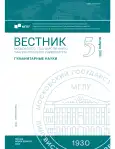Online Interpreting: Peculiarities and Difficulties
- Авторлар: Dadyko A.V.1
-
Мекемелер:
- Moscow State Linguistic University
- Шығарылым: № 5(886) (2024)
- Беттер: 34-40
- Бөлім: Linguistics
- URL: https://journal-vniispk.ru/2542-2197/article/view/303302
- ID: 303302
Дәйексөз келтіру
Толық мәтін
Аннотация
The article discusses the main features and difficulties a translator encounters when working online. The article shows the reasons for the rapid pace of development of this type of translation, its advantages and disadvantages. The article presents a brief description of the main technologies of remote interpreting, gives practical recommendations on preparation, organization of the workplace and preparation of equipment. The special importance of sound for the quality of translation is considered.
Авторлар туралы
Andrei Dadyko
Moscow State Linguistic University
Хат алмасуға жауапты Автор.
Email: avdad@bk.ru
Senior lecturer at the Department of the Italian Language
РесейӘдебиет тізімі
- Alekseitseva, T. A., Magnes, N. O., Ivanova, E. P., Koryshev, M. V. (2020). Professional training of translators in the new reality: new challenges and new competencies. Ancient and New Romania, 26, 260–271. (In Russ.)
- Spinolo, N., Amato, A. (2020). Technology in Interpreter Education and Practice : Introduction. inTRAlinea. Special Issue. Technology in Interpreter Education and Practice. https://www.intralinea.org/index.php/specials/ article/2520.
- Mouzourakis, P. (2006) Remote Interpreting, a Technical Perspective on Recent Experiments, Interpreting International Journal of Research and Practice in Interpreting, 8(1), 45–66.
- Ball, M. (2021). Distance Interpreting and the Risk of Alienation. In Seeber, K. G. (ed.), A 100 years of Conference Interpreting (pp. 262–269). Newcastle upon Tyne : Cambridge Scholars Publishing.
- Krasnopeeva, E. S. (2021). Distance Interpreting: Terminology, Taxonomy, and Key Directions of Research. Nauchnyi dialog, 11, 143–167. (In Russ.).
Қосымша файлдар










